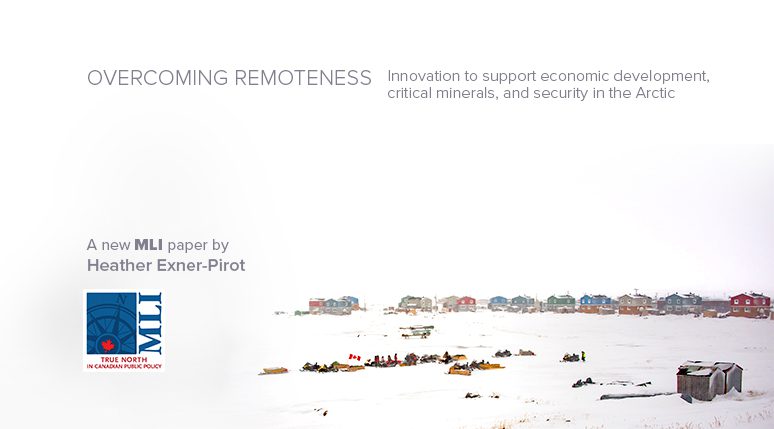OTTAWA, ON (July 11, 2023): Cold, vast, and remote – few words better capture the image Canadians have of the Arctic. Although the inhospitable nature of Canada’s North may have contributed to the broader apathy to the region, from a development perspective, remoteness is the real challenge. Costs are higher for services, goods, and infrastructure than in the rest of Canada; there are also persistent gaps in quality-of-life indicators. The prevailing strategy has been to secure more transfers to prop up standards of living, without meaningfully improving them.
In this new MLI paper, Overcoming remoteness: Innovations to Support Economic Development, Critical Minerals, and Security in the Arctic, Senior Fellow and Energy Program Director Heather Exner-Pirot considers new and better ways to address the Arctic’s remoteness.
“The combination of the desired energy transition and the need to secure critical minerals from friendly sources may finally be the impetus needed to shake the region out of its current development paradigm,” writes Exner-Pirot.
Although many articles on the Arctic claim that it is becoming more accessible to develop resources there due to climate change, this is not the case. Climate changes make resource extraction projects more difficult in the Arctic, not easier.
“Even under current conditions, with many jurisdictions concerned about the supply of critical minerals and enacting incentives and strategies to boost production, global mining production has stalled,” writes Exner-Pirot. “Far from meeting energy transition requirements, the world is mining less than it did in 2019.”
Nonetheless, a few transformative technologies have the potential to develop the Arctic: small modular reactors (SMRs) to supply energy to remote locations; airships to supply transportation to and from remote regions; and fibre networks to give remote locations good communications options. It would also be beneficial for Canada’s military considering the great power competition in the region, and heightened tensions following the Russian invasion of Ukraine.
“Much work remains to turn these innovations into reality, and there are undoubtedly other tools and strategies that will play an important role as well,” writes Exner-Pirot.
“But the concurrent climate, energy, and security crises are presenting an opportunity to address the challenges of remoteness in the Arctic in new and better ways. It would be a shame to waste it.”
To learn more, read the full paper here:
***
Heather Exner-Pirot is a Senior Fellow and Director of the Natural Resources, Energy and Environment Program at MLI.
For further information, media are invited to contact:
Skander Belouizdad
Communications Officer
613-482-8327 x111
skander.belouizdad@macdonaldlaurier.ca







